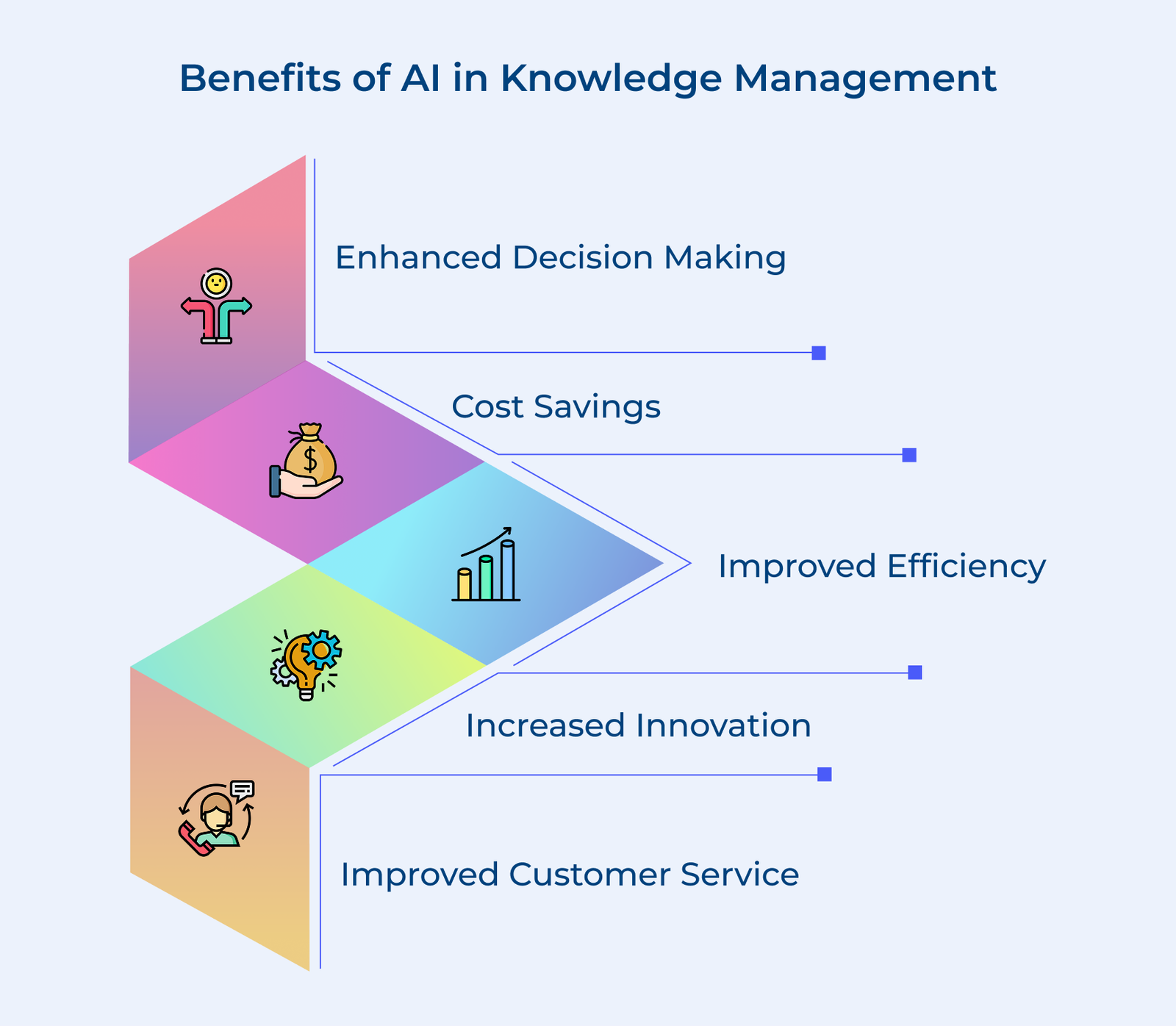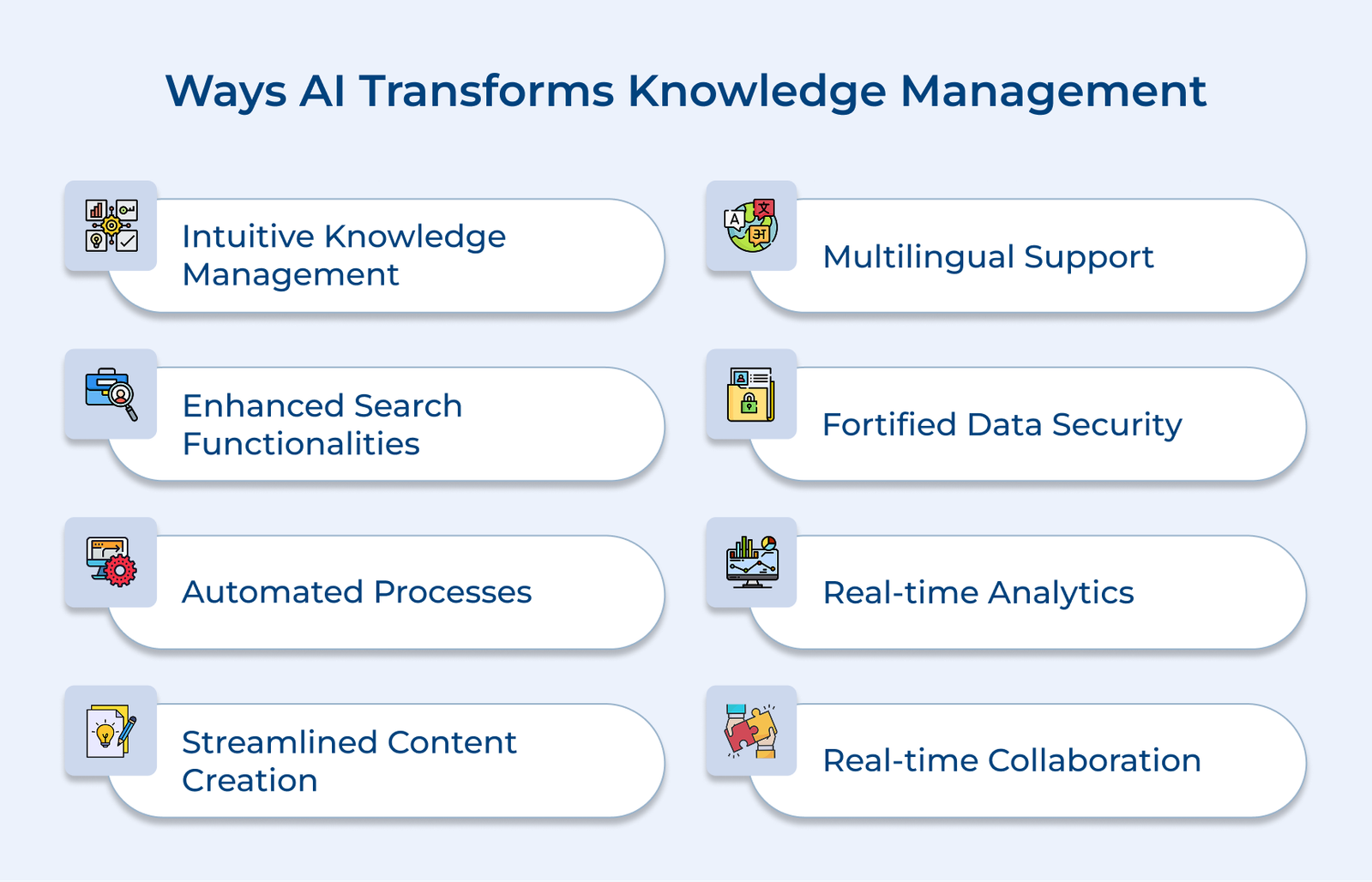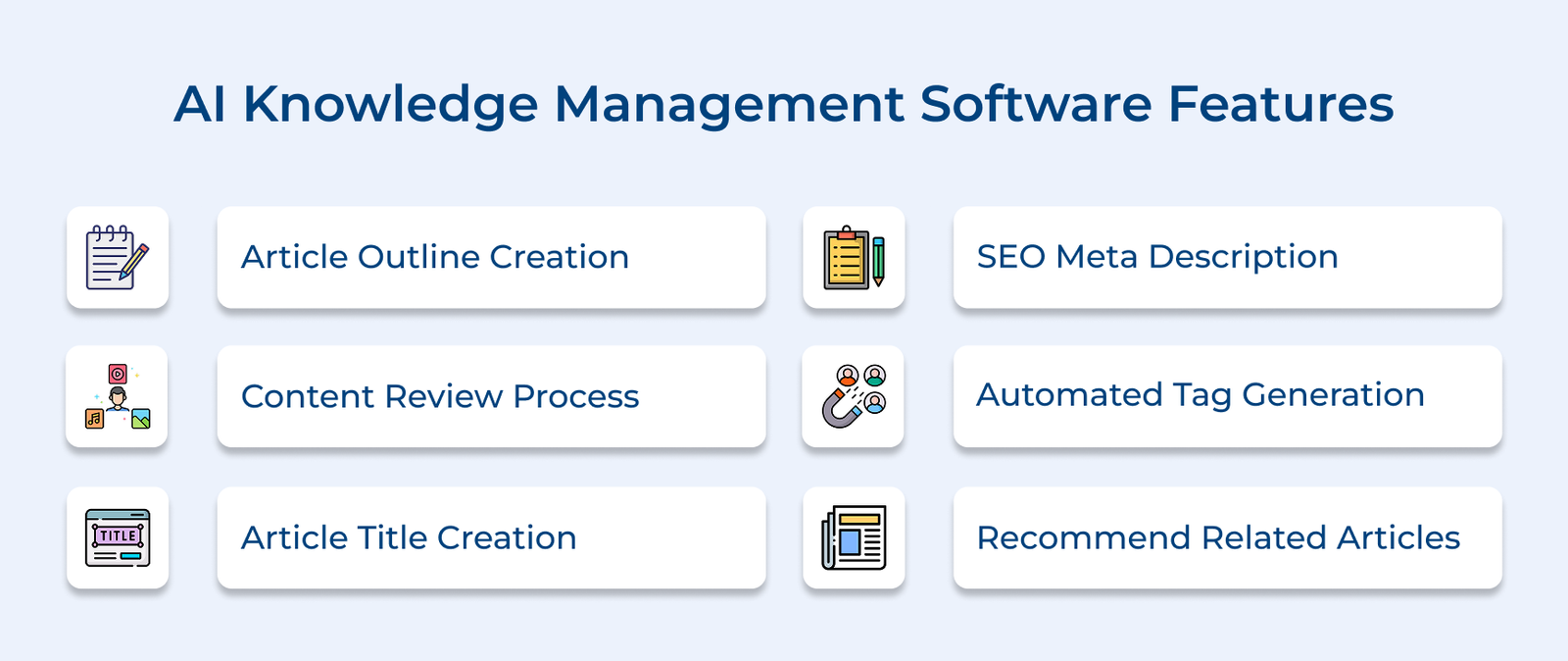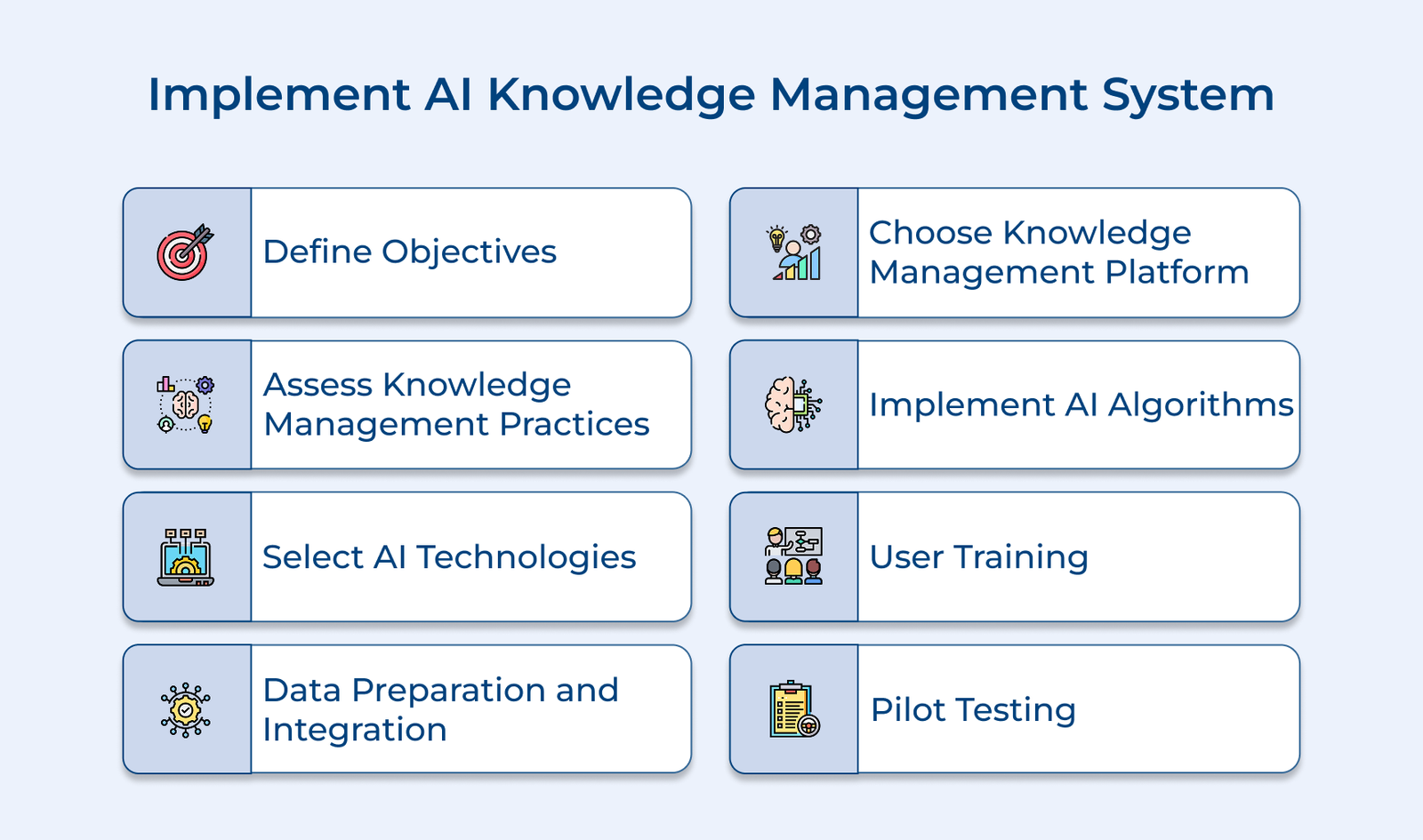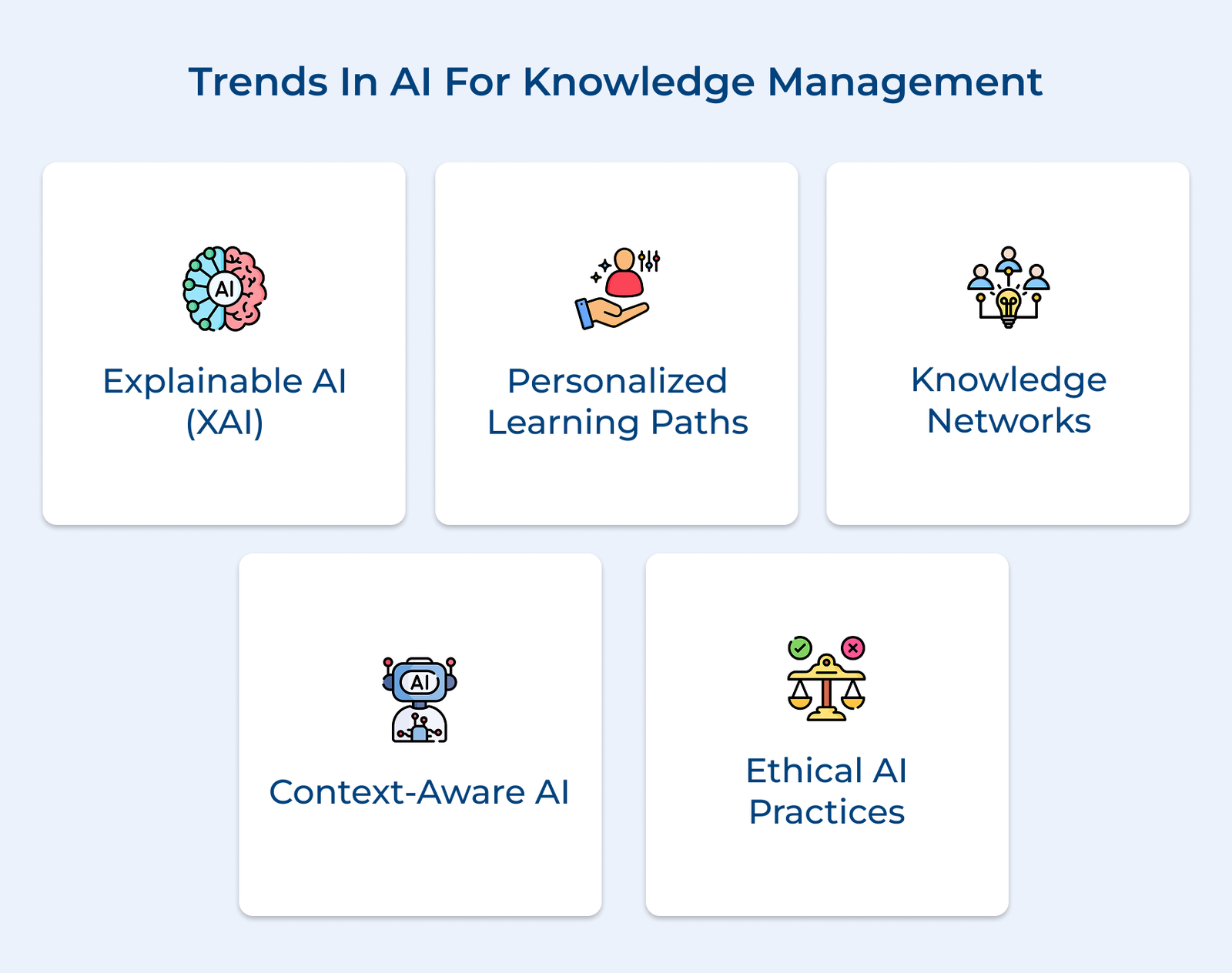1. Powers Intuitive Management of Knowledge
AI is revolutionizing the way knowledge is managed by powering intuitive knowledge management through advanced technologies like Natural Language Processing (NLP). NLP enables users can retrieve information using natural language queries, making knowledge access more seamless and efficient. AI algorithms can intelligently classify and organize vast amounts of information, ensuring that relevant data is easily discoverable.
AI can automate the tagging and metadata generation process, eliminating the need for manual effort. It enables consistent and accurate labeling of knowledge assets. The step streamlines knowledge organization and retrieves processes, enhancing knowledge management efficiency.
Best practices:
- Invest in high-quality training data to enhance the accuracy of AI models for classification, tagging and NLP.
- Integrate AI-powered knowledge management systems with existing enterprise applications and data sources for seamless knowledge flow.
- Continuously refine AI models to adapt to evolving organizational needs and ensure optimal performance.
2. Enhances Search Functionalities
AI is transforming knowledge management by enhancing search functionalities, making it easier for users to find the information they need quickly and accurately. AI-powered search engines leverage advanced algorithms and machine learning techniques to provide sophisticated search capabilities that go beyond traditional keyword-based searches.
One key advantage is the ability to perform contextual and semantic searches, where AI can understand the intent behind search queries, delivering highly relevant results. AI can also provide intelligent offers and personalized search experiences by analyzing user behavior.
Pro tips:
- Continuously improve AI models using feedback and user interactions to refine search relevance.
- Leverage user data to personalize search experiences and deliver tailored recommendations.
3. Automates Processes
AI is automating processes within knowledge management, streamlining operations and increasing efficiency. One key aspect is Robotic Process Automation (RPA), where AI-powered software robots can handle rule-based tasks, freeing up human agents for more complex work.
AI also enables automated knowledge extraction, intelligently identifying, extracting and organizing relevant information from various sources, such as documents. AI-driven intelligent workflow management optimizes knowledge management processes, ensuring seamless coordination of tasks, approvals and notifications.
Pro tips:
- Map and prioritize processes for automation, focusing on high-impact, repetitive tasks.
- Ensure data quality to enhance the accuracy and reliability of AI-powered automation.
- Implement robust governance and change management processes to maintain automated processes.
4. Streamlines Content Creation
AI is revolutionizing content creation within knowledge management by streamlining the entire process, from ideation to optimization. AI-assisted content generation leverages NLP and machine learning algorithms to generate high-quality, relevant content based on existing data. AI can automate content summarization and repurposing, intelligently condensing lengthy documents into concise summaries or adapting content for different formats.
AI also plays a crucial role in intelligent content optimization and personalization. AI can tailor content to specific audiences by analyzing user behavior, preferences and context, enhancing knowledge retention.
Best practices:
- Invest in high-quality training data and continuously refine AI models to improve content quality.
- Integrate AI-powered content creation tools with existing knowledge management systems for seamless workflow integration.
5. Offers Multilingual Support
AI is transforming knowledge management by offering multilingual support, breaking down language barriers and enabling global knowledge access. Machine translation powered by AI allows organizations to translate knowledge assets into multiple languages. It ensures that valuable information can be shared across diverse teams and global operations.
AI also facilitates cross-lingual information retrieval, enabling users to search and access relevant knowledge assets regardless of the language they are written in. AI can assist in multilingual content creation, automating the process of generating content in multiple languages and ensuring consistency across linguistic versions.
Best practices:
- Invest in high-quality machine translation models and continuously refine them with domain-specific data.
- Integrate multilingual support seamlessly into existing knowledge management systems and workflows.
6. Fortifies Data Security
AI is fortifying data security within knowledge management by leveraging advanced techniques for threat detection and prevention. AI-powered systems can analyze vast amounts of data, identifying potential threats and anomalies in real-time. The proactive approach enables organizations to protect sensitive knowledge assets from cyber attacks, data breaches and unauthorized access.
AI enables intelligent access control and user authentication mechanisms, ensuring that only authorized individuals can access knowledge assets. It is achieved through techniques like biometric authentication, behavioral analysis and risk-based access management.
Pro tips:
- Continuously update AI models with the latest threat intelligence and security data.
- Implement robust data governance and privacy protocols to ensure the ethical use of AI in security measures.
- Integrate AI-powered security solutions seamlessly with existing knowledge management systems and infrastructure.
7. Provides Real-time Analytics
AI is revolutionizing knowledge management by providing real-time analytics, enabling organizations to make data-driven decisions and gain valuable insights. Through predictive analytics, AI can analyze vast amounts of data, identify patterns, and forecast future trends. It empowers organizations to anticipate and prepare for upcoming challenges or opportunities.
AI-powered sentiment analysis and user behavior insights allow organizations to understand how knowledge assets are being perceived. AI also enhances intelligent reporting and data visualization, transforming complex data sets into compelling visual representations. It makes it easier to communicate insights and drive informed decision-making.
Things to consider:
- Establish clear goals and metrics for analytics to align with organizational objectives.
- Enhance a data-driven culture by providing training and empowering employees to leverage AI-powered analytics effectively.
8. Facilitates Real-time Collaboration and Knowledge Sharing
AI is revolutionizing knowledge management by facilitating real-time collaboration and knowledge sharing. AI-powered virtual assistants enable seamless communication and knowledge sharing across teams and organizations.
Intelligent knowledge-sharing platforms leverage AI to curate, organize and disseminate relevant information, enhancing efficient knowledge transfer. Co-creation tools, powered by AI, facilitate simultaneous editing, ideation and problem-solving, breaking down geographical barriers.
Pro tips:
- Embrace AI-driven knowledge management tools to streamline knowledge sharing, reducing silos and promoting cross-functional synergies.
- Integrate AI-powered virtual assistants into the knowledge management ecosystem to provide personalized, contextual information access and support.
Key Features in AI Knowledge Management Software
Discover the essential features to look for in AI knowledge management software to maximize its benefits.






